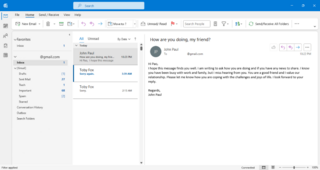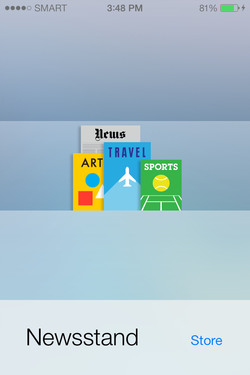
Microsoft Outlook is a personal information manager software system from Microsoft, available as a part of the Microsoft 365 software suites. Though primarily being popular as an email client for businesses, Outlook also includes functions such as calendaring, task managing, contact managing, note-taking, journal logging, web browsing, and RSS news aggregation.

Calendar is a personal calendar app made by Apple Inc. for its macOS, iOS, iPadOS, and watchOS operating systems. It offers online cloud backup of calendars using Apple's iCloud service, or can synchronize with other calendar services, including Google Calendar and Microsoft Exchange Server.

SOGo is an open source collaborative software (groupware) server with a focus on simplicity and scalability.
Kolab is a free and open source groupware suite. It consists of the Kolab server and a wide variety of Kolab clients, including KDE PIM-Suite Kontact, Roundcube web frontend, Mozilla Thunderbird and Mozilla Lightning with SyncKolab extension and Microsoft Outlook with proprietary Kolab-Connector PlugIns.
DeltaSync was a proprietary Microsoft communications protocol for synchronizing web services with offline clients. It was switched off by Microsoft on 30 June 2016.

MediaFire is a file hosting, file synchronization, and cloud storage service based in Shenandoah, Texas, United States. Founded in June 2006 by Derek Labian and Tom Langridge, the company provides client software for Microsoft Windows, macOS, Linux, Android, iOS, BlackBerry 10, and web browsers. MediaFire has 43 million registered users and attracted 1.3 billion unique visitors to its domains in 2012.
MobileMe is a discontinued subscription-based collection of online services and software offered by Apple Inc. All services were gradually transitioned to and eventually replaced by the free iCloud, and MobileMe ceased on June 30, 2012, with transfers to iCloud being available until July 31, 2012, or data being available for download until that date, when the site finally closed completely. On that date all data was deleted, and email addresses of accounts not transferred to iCloud were marked as unused.
This is a comparison of online backup services.

ZumoDrive is a defunct cloud-based file hosting service operated by Zecter, Inc. On December 22, 2010, Zecter announced its acquisition by Motorola Mobility. The service enabled users to store and sync files online, and also between computers using their HybridCloud storage solution; the latter functionality stopped working in approximately September 2011, while the former was undergoing formal takedown on May 1, 2012. ZumoDrive had a cross-platform client that enabled users to copy any file or folder into the ZumoDrive virtual disk that was then synced to the web and the users' other computers and hand-held devices. Files in the ZumoDrive virtual disk could be shared with other ZumoDrive users or accessed from the web. Users could also upload files manually through a web browser interface. A free ZumoDrive account offered 2 GB of storage, and users could upgrade to paid plans ranging from 10 GB to 500 GB for a monthly subscription fee. The ZumoDrive service was integrated into Yahoo! Mail, allowing users to send or receive any file on their ZumoDrive, and powers HP's recent CloudDrive technology, bundled on all new HP Mini netbooks.
CloudMe is a file storage service operated by CloudMe AB that offers cloud storage, file synchronization and client software. It features a blue folder that appears on all devices with the same content, all files are synchronized between devices. The CloudMe service is offered with a freemium business model and provides encrypted SSL connection with SSL Extended Validation Certificate. CloudMe provides client software for Microsoft Windows, macOS, Linux, Android, iOS, Google TV, Samsung Smart TV, WD TV, Windows Storage Server for NAS and web browsers.

Google Sync was a file synchronization service from Google that provided over-the-air synchronization of Gmail, Google Contacts, and Google Calendar with PC and mobile device Mail, Calendar and Address Book applications. It used Microsoft® Exchange ActiveSync® to let service users synchronize their Google Apps mail, contacts, and calendars to their mobile devices, wherein the users can also set up or customize the alerts for incoming messages and upcoming meetings. Google Sync worked with PC, Mac, Linux, Android, BlackBerry, Symbian S60, iPhone, iPad, Windows Mobile, and other devices. Google Sync was announced in February 2009 and discontinued for non-business users in December 2012.

iCloud is a cloud service developed by Apple Inc. Launched on October 12, 2011, iCloud enables users to store and sync data across devices, including Apple Mail, Apple Calendar, Apple Photos, Apple Notes, contacts, settings, backups, and files, to collaborate with other users, and track assets through Find My. It is built into iOS, iPadOS, watchOS, tvOS, macOS, and visionOS. iCloud may additionally be accessed through a limited web interface and Windows application.

Newsstand was a built-in iOS application for the iPad, iPhone and iPod touch. It was dedicated to downloading and displaying digital versions of newspapers and magazines. It was replaced by Apple News in iOS 9.

ownCloud is a free and open-source software project for content collaboration and sharing and syncing of files in distributed and federated enterprise scenarios. It allows companies and remote end-users to organize their documents on servers, computers, and mobile devices and work with them collaboratively while keeping a centrally organized and synchronized state.
Yandex.Disk is a cloud service created by Yandex that lets users store files on “cloud” servers and share them with others online. The service is based on syncing data between different devices. Yandex.Disk was launched in English in June 2012.
CompanionLink is a contact and calendar synchronization software that syncs data across smartphone and tablet devices, computers, and web-based applications. The software is developed by Portland, OR-based CompanionLink Software, Inc. CompanionLink Software, Inc. also develops DejaOffice—contact management mobile app for Android, iPhone, BlackBerry, and Windows Phone—and a secure cloud-based sync service called DejaCloud.

Resilio Sync by Resilio, Inc. is a proprietary peer-to-peer file synchronization tool available for Windows, Mac, Linux, Android, iOS, Windows Phone, Amazon Kindle Fire and BSD. It can sync files between devices on a local network, or between remote devices over the Internet via a modified version of the BitTorrent protocol.
IQTELL was a productivity app that allowed users to manage email, tasks, projects, calendars, contacts, Evernotes and more in a single app. IQTELL was available as a web app, as well as an iOS and Android app. All user information was automatically synced between all devices. iOS and Android apps supported offline access. The app could be used to implement concepts and techniques described in the book Getting Things Done by David Allen.
Firebase, Inc. is a set of backend cloud computing services and application development platforms provided by Google. It hosts databases, services, authentication, and integration for a variety of applications, including Android, iOS, JavaScript, Node.js, Java, Unity, PHP, and C++.

Joplin is a free and open-source desktop and mobile note-taking and to-do list application written for Unix-like and Microsoft Windows operating systems, as well as iOS, Android, and Linux/Windows terminals, written in JavaScript. The desktop app is made using Electron, while the mobile app uses React Native.










